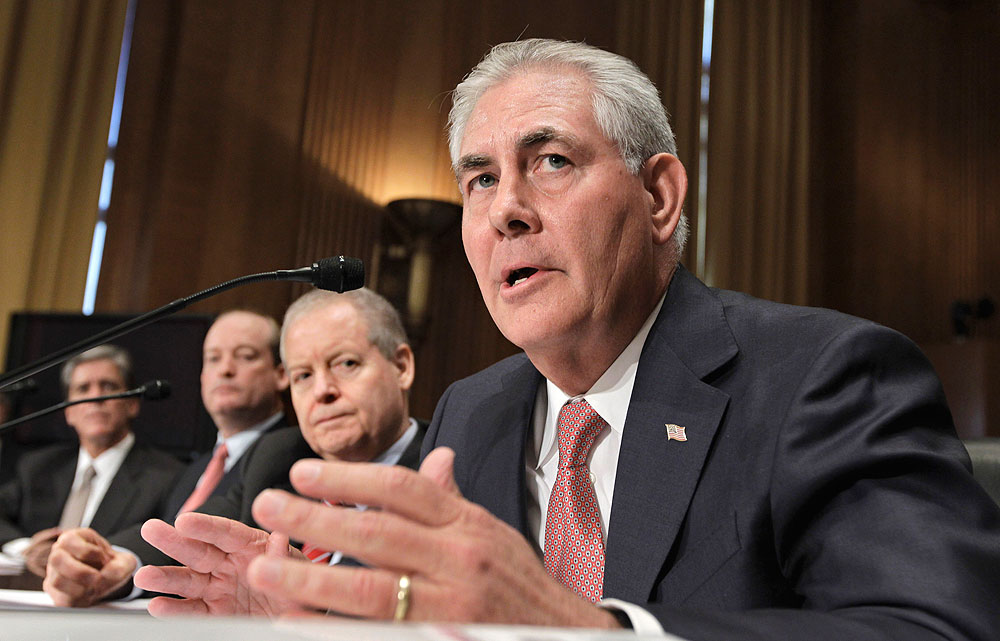
The 2013 profit totals are in for the big five oil companies — BP, Chevron, ConocoPhillips, Exxon Mobil and Shell. Their financial reports indicate that they earned a combined total of $93 billion last year, or $177,000 per minute.
After years of oil production declines, the big five oil companies actually increased their total production in 2013, predominately due to BP and ConocoPhillips almost doubling their total production. The companies’ higher oil production yet lower profits indicate that it is becoming more expensive to produce oil as the number of newer, easier, and cheaper fields shrink.
This is why, despite their outsized earnings, the oil companies are not only fighting to keep their tax breaks but also lobbying to lift the crude oil export ban. But doing so could hurt working families, our economy, and our energy security. Instead, we need to invest in cleaner transportation alternatives.
As mindboggling as it sounds, Big Oil’s $93 billion in profits in 2013 — impressive by any standard — were nonetheless a 27 percent reduction in profits compared to 2012, primarily because gasoline averaged 16 cents per gallon — or 4 percent — less. Despite the decreases, Exxon Mobil, Shell, and Chevron still had the first, seventh, and eighth, respectively, highest profits of any global public company on the 2013 Fortune 500 list.
BP finished 30th, while ConocoPhillips ranked 50th, mostly because it spun off its refining business partway through 2012.
It would not be surprising if the big five oil companies use their 2013 decline in profits as another excuse to pressure Congress to retain their $2.4 billion-per-year tax breaks. The largest of these special provisions allows these companies to qualify for the “limitation on section 199 deduction attributable to oil, natural gas, or primary products,” which will cost taxpayers $14.4 billion over 10 years, according to the Congressional Joint Committee on Taxation.
This tax break was enacted in 2004 and was designed to encourage manufacturing to remain in the United States rather than move overseas. It ought not apply to oil and natural gas production since the oil and gas fields cannot be moved to another nation.
The Joint Committee on Taxation found that the second-largest deduction was for “modifications of foreign tax credit rules applicable to major integrated oil companies which are dual capacity taxpayers.” This provision is worth $7.5 billion over 10 years. Seth Hanlon, former Director of Fiscal Reform at the Center for American Progress, best describes why this tax break is unwarranted:
“Our tax system allows companies that do business abroad to reduce from their tax bill any income taxes paid to other governments. The rules are supposed to prevent oil companies from claiming credit for royalty payments to foreign governments. Royalties are not taxes; they are fees for the privilege of extracting natural resources. “…Oil companies have been permitted to claim credits for certain payments to foreign governments, even in countries that generally impose low or no business tax (suggesting that [these payments](https://www.jct.gov/publications.html?func=startdown&id=3704), or levies, are in fact a form of royalty). Dual capacity taxpayer rules, therefore, are a subsidy for foreign production by U.S. oil companies.”
The decline in profits is also why the American Petroleum Institute, Exxon Mobil, and other oil companies are lobbying to lift the crude oil export ban, which would enable them to sell their domestic oil at the world, or Brent, price that fetched nearly $10 per barrel more than the domestic, or West Texas Intermediate, price on February 7.
Lifting the ban would force the United States to import more expensive foreign oil to replace the exported domestic oil, which could raise gasoline prices. Banking giant Barclays Plc predicts that lifting the current ban could add $10 billion annually to gasoline prices paid at the pump.
If there is any good news here for American families and businesses, it is that gasoline prices, which hit a record high in 2012, were lower in 2013. This cut at the pump reduced the average household’s annual gasoline expenditures.
The fact that profits decreased in 2013 despite production increasing calls into question the big five companies’ reliance on finding and developing more difficult, dangerous oil fields — such as those in the Arctic Ocean. It is fairly clear that such a business model is not economically sustainable. Instead, they — and we — could benefit from greater investment in cleaner, alternative transportation technologies.
Of course, when it comes to spending their money, the priorities of oil companies are fairly obvious. All of the companies, except for ConocoPhillips, spent a combined total of $32 billion, or nearly 40 percent of their total profits, to repurchase their own stock. This increases the value of the remaining shares, providing a bounty to senior executives, boards of directors, and other large shareholders.
The CEOs of these five companies had a combined compensation of $96 million in 2012, the last year for which data are available, or nearly $20 million per CEO. This is nearly 400 times greater than the $51,107 median income for a family of four during that same year.
These five major oil corporations also spent $45 million on lobbying in 2013; every $1 spent on lobbying helped the companies protect $53 of their tax breaks — an outstanding rate of return.
In addition to receiving unjustified tax breaks, the big five oil companies also benefit from the lack of federal limits on carbon pollution generated by oil and gas production, transportation, and refining. The Environmental Protection Agency reported that “petroleum and natural gas systems” and refiners were the second- and third-largest sources of carbon and other climate pollution among the major industrial sectors that must report their emissions.
Since there are no federal limits on this pollution, American families and businesses must bear the costs of more climate pollution, such as damages from extreme weather events, heightened smog, and tropical diseases. These — and other — oil companies can dump their carbon and other climate pollution in the sky for free. And at our expense.
Despite the decline in profits in 2013, BP, Chevron, ConocoPhillips, Exxon Mobil, and Shell are some of the richest, most profitable companies in the world. They produce a valuable commodity that is essential to our economy. However, their proposal to eliminate the crude oil export ban, their battle to keep some unnecessary federal tax breaks, and their uncontrolled climate pollution all could or do impose real costs on American families. It’s up to President Barack Obama and Congress to retain and adopt policies that benefit all Americans, not just Big Oil’s bottom line.
Daniel J. Weiss is a Senior Fellow and Director of Climate Strategy at the Center for American Progress. Miranda Peterson is a Special Assistant for the Energy Opportunity team at the Center.
3 WAYS TO SHOW YOUR SUPPORT
- Log in to post comments














